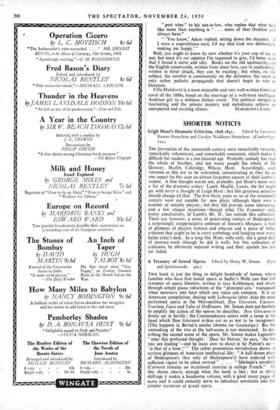Fiction
Ifs no use. Honesty is the last refuge of the critic. There's nothing for it but to stiffen the sinews and declare boldly that I enjoyed The Other Side of the Sun more than any novel l've read for ages, and " enjoyed " is the operative word. Yes, I know that the party line is an utter contempt for science-fiction, but who, recalling earlier innocent pleasures with Wells and Verne, could fail to delight in a return to those pleasant pastures where the space-ship cleaves the Heaviside Layer, skimming round the Earth's orbit till it lands on undiscovered Antigeos where enormous surpluses, piled up in caves, inevitably produce our old friend, the uncompetitive economic Utopia ? (Why, incidentally, doesn't someone someday discover not an economic but an ideological Utopia?) My own science stopped at precipitating sulphuric acid crystals, but all Mr. Capon's scientific stuff seems frightfully engaging and sound, and how very reassuring again to be able to be at one with science, the reader's friend instead of the last enemy ict the last ditch. Mr. Capon writes with wit and the utmost verisimilitude ; he promises a sequel and I, personally, can hardly wait.
Mountain Rescue is an unusually competent if somewhat arid first novel. An elderly doctor whose life has been devoted to doing social good regardless and remorseless finds himself impulsively fleeing through the W.elsh mountains as protector of an escaping German prisoner-of-war. The prisoner, not unnaturally, tries to discover why the doctor does this, and further, whether the doctor has an answer to his own dilemma, which is how our English belief in moral right can be proved better than the beliefs of the Nazis. The answer seems to me to be rather frightening, for it is, to quote Leonard Woolf in another context, that "a belief you can give no reason for believing is more spiritual than and ethically superior to one for which you can give a reason." The doctor gets himself into a violently expiatory state of mind, the prisoner-of-war too, and, as usual these days, awkward practical difficulties are resolved by timely death. It's a pity that the spiritual content of the story is E3 woolly, for the few events it contains and, in particular, the moun- tain-climbing, are so crisply and excitingly described, and the general plan and economy of the book are far superior to those of most first novels.
The doctor's dilemma would have been swept away had he read A Man's Life, which has no doubt at all that Man, so Jong zs he is English Squire, is a Noble Animal and a Fit Friend for Horse. The fairest way to allow you to judge of this book, whichr... cvers the life of Adam Sibthorpe, born of a family dating tack to the Confessor, is by quotation. Here is Adam, having fled from the Manor after a disappointment in love, at work in London on a paper evocatively called The New Radical: "His chief tasks were to sift the speeches of all Conservatives and most peers, in order to cull from them any statement that might be used against them, and tO collect material for a column entitled In England Now which was intended to ridicule gentlefolk and especially serving officers, bishops, and fox- hunting squires.% . . Therein lay his treachery."
And here is a war-time letter from his daughter Elizabeth:
"In the Service, of course, the officers are quite different from the general run, but now and again the wrong type creeps In, and then it's a case of self all the time. They mean well They try hard. But the difference is glaring. . . . There jt-sl aren't enough of us to go round."
And here Is Adam, an old man now, offering whiskey or "port wine" to his son-in-law, who replies that what he'd like more than anything is " . . some of that Ovaltine you always have."
"'You know,' Adam replied, setting down the decanter, 'if I were a superstitious man, I'd say that God was deliberately making me happy.'"
Well; you ought to know by now whether it's your cup of tea or not, but since it's my opinion I'm supposed to give, I'd better state that I found it naive and .silly. Books on the old squirearchy and the English countryside, written from sheer love, can be enchanting ; written in bitter attack, they can be exciting ; but when, on any subject, the novelist is continuously on the defensive, the result is only rather pathetic ,propaganda that doesn't begin to rate as literature.
Villa Malaforza is a most enjoyable and very well-written historical novel of the 1880s, based on the marriage of a well-born intelligent Austrian girl to a dubious Italian count. The political intrigue is fascinating and the private mystery and melodrama achieve an















































































 Previous page
Previous page